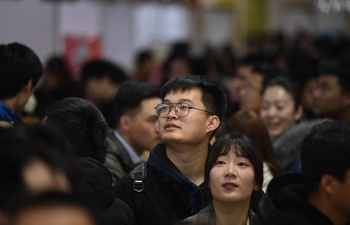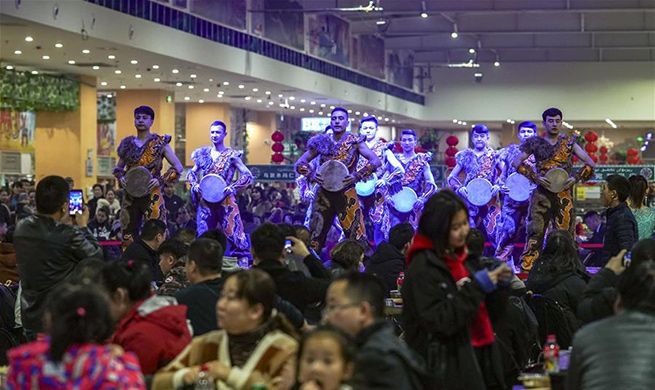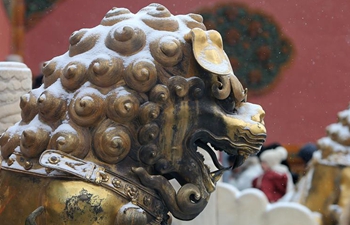by Alessandra Cardone
ROME, Feb. 15 (Xinhua) -- Second generations of Chinese immigrants in Italy were quite highly educated, relatively wealthy, and overall better integrated than their parents, a fresh publication by Italy-China Foundation revealed on Friday.
The profile of the newest Chinese immigrants was drawn by the 163rd issue of Mondo Cinese (Chinese World), a scientific fourth-month magazine focused on contemporary China studies.
Presented at a conference in Milan, the current issue was titled "The New Chinese in Italy" and provided a comprehensive analysis of the most recent evolution occurring in one of the country's largest foreign communities.
In the presentation, Italy-China Foundation director general Vincenzo Petrone praised Chinese immigrants for their dynamism, describing them as "a microcosm that mirrors the same features and ingredients that have been boosting China's economic growth for 40 years".
"They have strong inter-personal bonds, and an extraordinary ability to integrate and to adjust in order to produce income and root themselves in the Italian society," Petrone said.
At the same time, the former Italian ambassador to Brazil and Japan added, the latest generations would not forget their roots, and were not giving up their original Chinese traditions and way of life.
"Today, the Chinese New Year celebrations are a regular event in many of our large and medium Italian cities, and an enrichment for our country," Petrone noted.
DRIVERS OF SOCIAL CHANGE
According to the authors -- both Chinese and Italians analysts -- second-generation Chinese have been "among the first to carve out a new space for participation in the public debate, in the composite mosaic of foreign immigration in Italy".
Second generations included both Chinese children born here, and those who entered the country at an early age.
Their average profile was that of people between the ages of 25 and 35, bilingual, educated, and "quite wealthy, robustly integrated in a small-middle entrepreneurial class".
"These people have grown up studying and working at the same time, within families that were ready to support them in any of their individual projects," the authors wrote.
"Being able to connect to a much wider range of people compared to parents, these generations are pioneers of a new kind of relationship between the Chinese minority and the Italian society," they explained.
WELL-ROOTED COMMUNITY
Overall, the Chinese immigration to Italy was among the oldest inflows, settling here since the late 1970s.
Today, the Foundation's magazine claimed, "the Chinese community provides an example of unique socio-economic integration in the (Italian) national landscape."
According to data provided by the most recent annual report on migrants issued by the Ministry of Labor and Social Policies (updated to Jan. 1, 2017), Chinese legal residents here were 318,975, representing the third largest population among non-EU residents, and the fourth if counting EU citizens.
Since long time, the Sino-Italian magazine argued, the community has been "permanently integrated in Italy's socio-economic fabric".
"The share of long-term resident permits showed a consistent upward trend, growing from some 39 percent in 2012 to 51 percent in 2017," authors highlighted.
Furthermore, some 26 percent of the Chinese residents in Italy were minors, testifying "the historical magnitude of the change that has been brought about by the second generations".
According to the magazine, the current demographic trends of Chinese residents here could make the community "the largest foreign minority of non-European origins in Italy by 2025".
STRONG BUSINESS ATTITUDE
Since they first settled in the Italian society, Chinese immigrants have also showed a strong entrepreneurial attitude, with a high rate of female participation.
Still according to the Ministry's data up to January 2017, in fact, they could boast the second highest number of foreign-run individual companies among foreign residing communities in Italy, with total 50,737 businesses (one for every six Chinese residents) and an annual growth rate at 3.4 percent.
Some 46 percent of these companies (23,437) were run by Chinese female entrepreneurs, "a percentage that has no comparison at national level," according to the authors.
"Chinese business women make up about one third of all foreign female entrepreneurs in Italy," they stressed.
Besides, Chinese women were well present across various sectors of the job market, making up to 47 percent of self-employed, 45 percent of employees, and 44 percent of independent workers (within the community).
Data by the Ministry of Labor and Social Policies further showed employment among Chinese immigrants was at about 72.5 percent, and unemployment was at 4 percent, four times lower than the average among non-EU citizens in the country.













